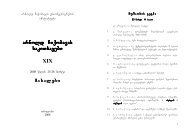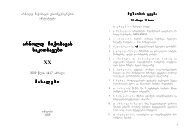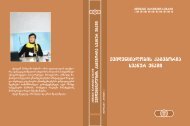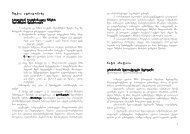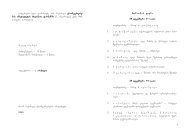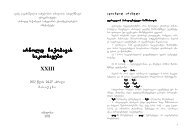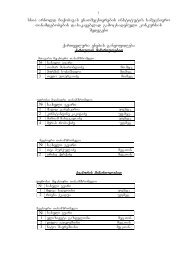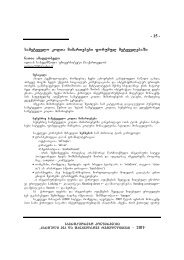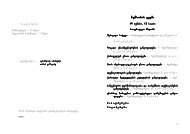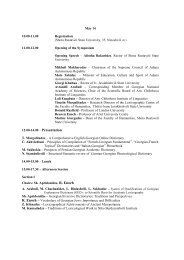5 r. a b a S i a (Tbilisi) bgeraTSesatyvisobis erTi rigisaTvis qarTvelur ...
5 r. a b a S i a (Tbilisi) bgeraTSesatyvisobis erTi rigisaTvis qarTvelur ...
5 r. a b a S i a (Tbilisi) bgeraTSesatyvisobis erTi rigisaTvis qarTvelur ...
You also want an ePaper? Increase the reach of your titles
YUMPU automatically turns print PDFs into web optimized ePapers that Google loves.
them, acquired the full aspect”. We conditionaly call such type of verbs as eKo-<br />
fis (it’s enough).<br />
The verb minda<br />
(I want) in the mentioned period may be present and<br />
continuous as well. In the present tense the old form mina<br />
substitutes it. Tu unda<br />
TviTon Ton daeyira<br />
(If he wants he could catch). midga<br />
da unda, Tumca<br />
tax<br />
axti<br />
tidam<br />
CamoiKva<br />
vanos<br />
nos.<br />
The most interesting are cases when present tense forms without prefixes,<br />
together with the present tense express the content of the future tense: ra gaxvi<br />
xvi-<br />
dode, de, guSag<br />
SagTa esmis abJri<br />
risa Cxere<br />
reba<br />
ba”. (As soon as you go out , the guard will<br />
hear the noise of armour). Seve<br />
vewKale<br />
lebi da sisxls Cemsa eZebso<br />
so, Sehfi<br />
hfica, Tu<br />
qaliS<br />
liSvi<br />
vili mome<br />
meces, Sen SegrTo<br />
da Seni Svili ari (Sweared, if I have a daughter<br />
I will marry her to you and she will be your daughter). ama yiri<br />
risa<br />
sagan nu<br />
mixsnas<br />
Gmer<br />
merTman, Tu uSeno<br />
nobi<br />
bisa gaZle<br />
Zleba maqus<br />
qusGa. ganaGam<br />
amca mogax<br />
gaxse<br />
senoT,<br />
Tu aw bedi asuls gvivis<br />
vis, etc.<br />
Georgian verb movals<br />
(I will come) has the meaning of the present tense<br />
in old Georgian. In the middle Georgian it is used in the same meaning (old aspect<br />
system) and also in the meaning of the future tense (new aspect system).<br />
By the first content it is replaced by the verb modis<br />
(is coming). For example:<br />
~ager,<br />
Cvenca<br />
maTad<br />
Svelad<br />
mival<br />
valTo<br />
To~. ~ma<br />
mamao,<br />
mao, amde<br />
deni<br />
xania, same<br />
mefo Cemi<br />
damig<br />
migdia da moval ama xmisa<br />
saTvis<br />
Tvis~ (present tense). ”aw movlen mterni<br />
Cemnio<br />
nio” (my enemies will come) (futute tense).<br />
Georgian verb icis (knows) in its origin belongs to the second special<br />
form of the conditional construction. It is true that in the middle century works<br />
it is understood as present, but sometimes it is used with the historical function<br />
that makes it homonymic form in this period: ”ra<br />
jami ician, mosw<br />
swKued<br />
eddi<br />
dian<br />
da alafob<br />
fobdi<br />
dian<br />
an”, “ra icis jami, brZoda<br />
da”. Seldom the number of the direct object<br />
is reflected in it, as it is characteristic for active voice verbs in the II and III<br />
series in analyzing period: “ma<br />
maGal<br />
alni igi SoriT icnis<br />
nis”. In this case it is used as<br />
with the function of II special form of the conditional construction but on one<br />
place it also assists the prefix in the meaning of the present tense: ”me misTvis<br />
movs<br />
vsul<br />
ulvar, vicni gzani Sesa<br />
saval<br />
valni<br />
ni”. The same may be said about other Georgian<br />
verb “uwyis<br />
uwyis”: saGmrTo weril<br />
rilni zepi<br />
pirad uwyniT (Knowing holy letters by heart).<br />
“ara<br />
aravin uwKnis<br />
jam<br />
amni<br />
ni” (nobody knows the time).<br />
130



